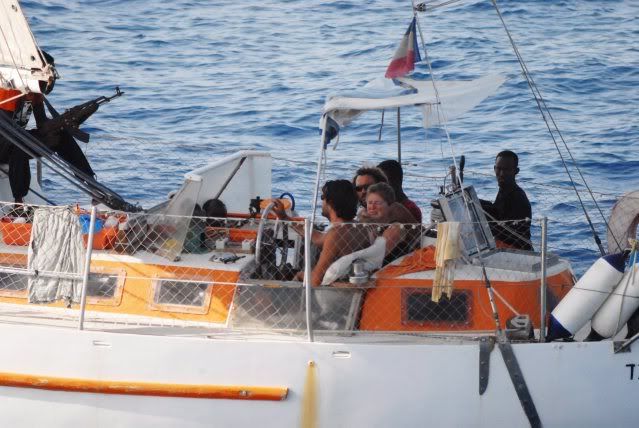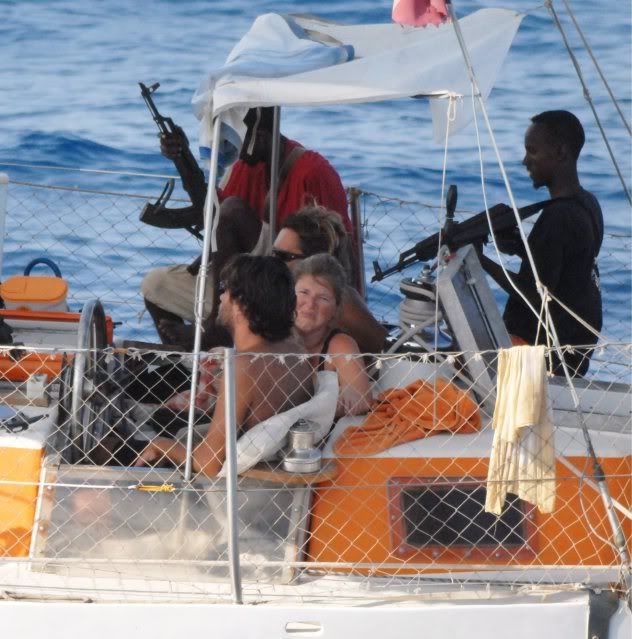Re: Piratas Somalis capturam Navio com blindados T-72
Enviado: Sáb Abr 11, 2009 9:49 am
A nossa Corte-Real, acabou de repelir um ataque a um cargueiro.
http://tsf.sapo.pt/PaginaInicial/Intern ... id=1199071Piratas lançam ataque contra navio no raio de acção de fragata portuguesa
Hoje às 13:38
Piratas somalis lançaram um ataque contra um cargueiro ao largo de Golfo de Aden e que estava no raio de acção de uma fragata portuguesa que se encontra no local. Fontes da NATO dizem que chegaram a ser disparados tiros contra o navio de pavilhão panamiano.
Piratas somalis atacaram, este sábado, um cargueiro de bandeira pananiama que no raio de acção da fragata portuguesa Corte-Real, no Golfo de Aden, tendo mesmo sido disparado tiros contra o MV Anatolia, afirmaram fontes da NATO, citadas pela agência Reuters.
Stephan Gresmak explicou que os oito piratas armados com metralhadoras AK-47 que, procuravam um alvo fácil ao atacarem o MV Anatolia, de pavilhão panamiano, acabaram por ser afastados graças ao uso de canhões de água.
«Numa inspecção feita mais tarde, o oficial comandante viu buracos feitos por tiros na superestrutura do barco», acrescentou este oficial, que disse que foi encontrada uma granada que não chegou a explodir na embarcação de pavilhão panamiano.
Este comandante disse também que o MV Anatolia terá também conseguido minimizar a acção dos piratas devido a manobras evasivas.
By Alison Bevege
ON BOARD NRP CORTE-REAL, April 11 (Reuters) - As acrid, choking fumes from a smoke grenade fill the lower deck of a Portuguese warship, the crew scramble into protective equipment to battle the "blaze".
The bi-weekly drill aboard the escort frigate Corte-Real, patrolling the pirate-infested Gulf of Aden, is vital to defend against the risk of either fire or suicide attack, like that which hit the USS Cole off the coast of nearby Yemen in 2000.
The Corte-Real joined the fight against Somali pirates after leaving the Omani port of Salalah on Wednesday evening, and its crew are proud to be part of Portugal's first such operation.
"We were the first ones to do a mission like this. It's going to be remembered," said Ricardo, a 28-year-old communications operator.
The escort frigate is operating under the command of NATO's Operation Allied Protector and is the flagship of a fleet of five international vessels.
Ship's captain Antonio Alexandre, 44, has no doubts about the strategic importance of the shipping route that runs through the Gulf of Aden to the Suez Canal, linking Europe to Asia.
"This region is one of the most important sea lines of communication in the world," he said.
The Corte-Real began her mission by escorting a convoy of two cargo vessels and a yacht through a designated safety corridor on Thursday.
All vessels in the area were invited to join the convoy, particularly slow-moving ships of 10 knots with low decks that are easy prey for the heavily-armed pirates in their skiffs, Alexandre said.
On Friday afternoon they handed their charges to NATO's Spanish frigate ESPS Blas de Lezo and began patrolling open waters, looking for trouble.
Equipped with a helicopter, heavy machine guns, high-speed intercept craft and missiles, the escort frigate is considered an ideal tool for the task. With a top speed of 32 knots, it is faster and more mobile than a big destroyer.
PIRATE OR FISHERMAN?
If a suspicious blip is picked up by the powerful radars being scanned 24 hours a day in the ship's nerve centre, the operations room, the helicopter is sent to investigate.
And if the vessel continues to behave suspiciously, the crew monitor it further, finally sending a high-speed, rigid-hulled inflatable boat to intercept and investigate, the captain said.
Pirates are indistinguishable from local fishermen, often until the point at which they launch an attack. Sinking an innocent fishing vessel would be a disaster so the Corte-Real must be certain before it takes action.
But the mission is dangerous for the crew. Heavily-armed Somali pirates can launch RPGs at the helicopter or spray bullets from their AK-47s at the sailors sitting exposed in the inflatable boat.
"We don't know what will be the reaction of the pirates," said Captain Alexandre. "When we send our people they are protected but we must expect the unexpectable."
The pirates are not the only unpredictable element Alexandre must face. He must abide by a raft of regulations, navigating his crew through NATO's rules of engagement while keeping to Portuguese laws as well.
To complicate the situation, a panoply of vessels from three treaty organisations and many other countries have descended on the Gulf looking to protect their trading interests. Merchant vessels have taken to hiring their own mercenaries.
All operate under different rules of engagement and speak a babel of languages, making communication a huge challenge.
"Integration is still missing," he said. "We should do something more to integrate the ships, but with so many different regions, countries and languages it is difficult to co-ordinate operations in such a large theatre of operations."
To cope with the scale of the task the crew maintain a constant state of readiness.
In the operations room and on the bridge, crew members like Principal Warfare Officer Underwater Joao Simoes take it in turns to work six hours on and six hours off, seven days a week.
Simoes said he averages four hours sleep between shifts. "But we can handle it, we are tough guys and tough women," he said.
Escorting ships and patrolling the region with warships is expensive for the international community.
But the International Maritime Bureau reports that 260 crew members from around the globe are being held hostage for ransom and there is no end in sight to Somalia's turmoil.
"There is a price for this," said Captain Alexandre. "It is very expensive to send ships. But what is the alternative --doing nothing?"
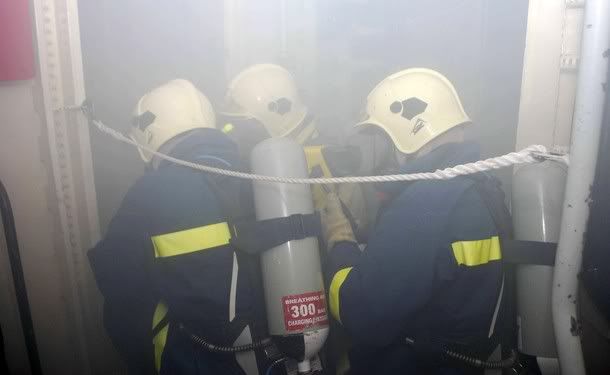
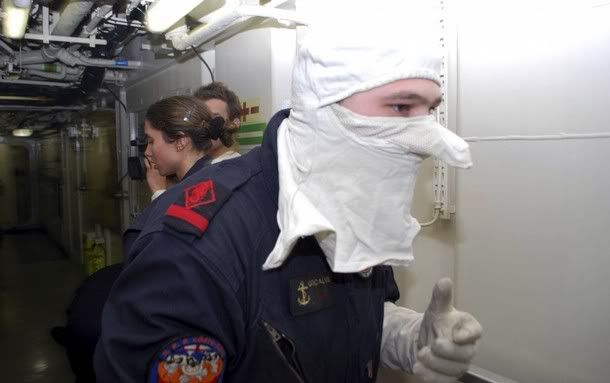
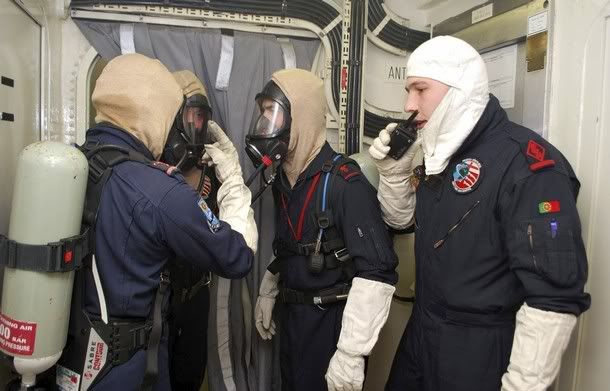
Portuguese crew aboard the warship NRP Corte-Real practice fire-fighting drills in the belly of the ship in the high seas of Indian Ocean off the Somalia coastline, April 10, 2009. As acrid, choking fumes from a smoke grenade fill the lower deck of a Portuguese warship, the crew scramble into protective equipment to battle the "blaze". The bi-weekly drill aboard the escort frigate Corte-Real, patrolling the pirate-infested Gulf of Aden, is vital to defend against the risk of either fire or suicide attack, like that which hit the USS Cole off the coast of nearby Yemen in 2000. The Corte-Real joined the fight against Somali pirates after leaving the Omani port of Salalah on Wednesday evening, and its crew are proud to be part of Portugal's first such operation. Picture taken April 10, 2009
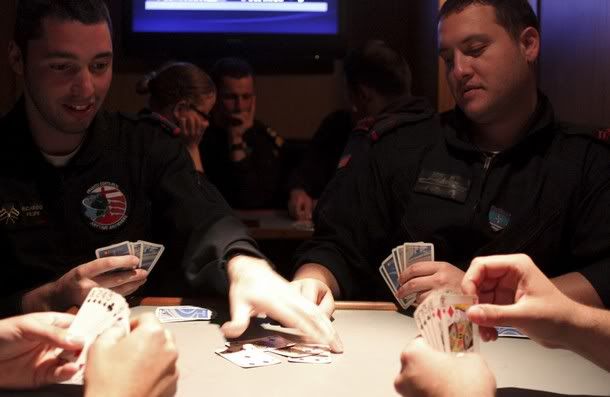
Portuguese crew aboard the warship NRP Corte-Real play cards in a bar deep within the belly of the ship in the high seas of Indian Ocean off the Somalia coastline, April 10, 2009, as they enjoy a few hours of recreation. As acrid, choking fumes from a smoke grenade fill the lower deck of a Portuguese warship, the crew scramble into protective equipment to battle the "blaze". The bi-weekly drill aboard the escort frigate Corte-Real, patrolling the pirate-infested Gulf of Aden, is vital to defend against the risk of either fire or suicide attack, like that which hit the USS Cole off the coast of nearby Yemen in 2000. The Corte-Real joined the fight against Somali pirates after leaving the Omani port of Salalah on Wednesday evening, and its crew are proud to be part of Portugal's first such operation. Picture taken April 10, 2009
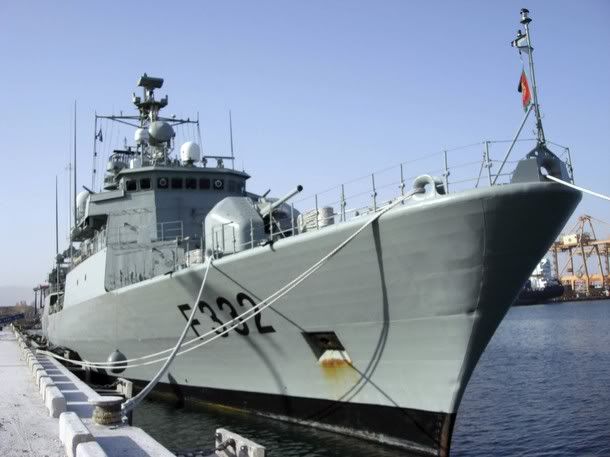
Portuguese warship NRP Cortte-Real is seen docked In the sea port city of Salalah in Oman, April 4, 2009. Portugal has become the latest of more than a dozen nations to join the fight against Somali pirates, sending an escort frigate to the world's most dangerous waterway. The importance of their work has been driven home this week with the first seizure of an American hostage by Somali pirates. Picture taken April 4, 2009
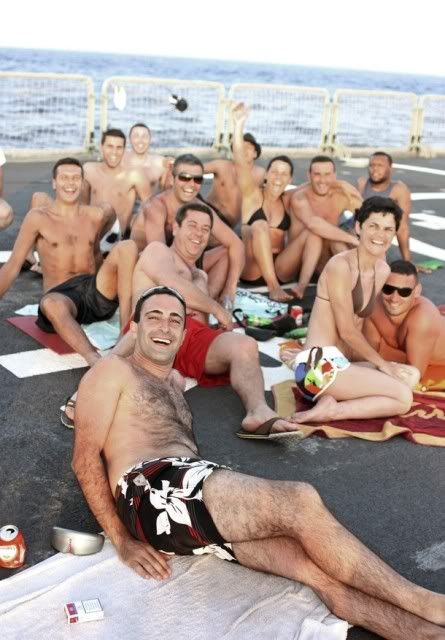
Portuguese crew aboard the warship NRP Corte-Real sun themselves on the deck in the high seas of Indian Ocean off the Somalia coastline, April 10, 2009, as they their time off work for recreation. As acrid, choking fumes from a smoke grenade fill the lower deck of a Portuguese warship, the crew scramble into protective equipment to battle the "blaze". The bi-weekly drill aboard the escort frigate Corte-Real, patrolling the pirate-infested Gulf of Aden, is vital to defend against the risk of either fire or suicide attack, like that which hit the USS Cole off the coast of nearby Yemen in 2000. The Corte-Real joined the fight against Somali pirates after leaving the Omani port of Salalah on Wednesday evening, and its crew are proud to be part of Portugal's first such operation. Picture taken April 10, 2009.
